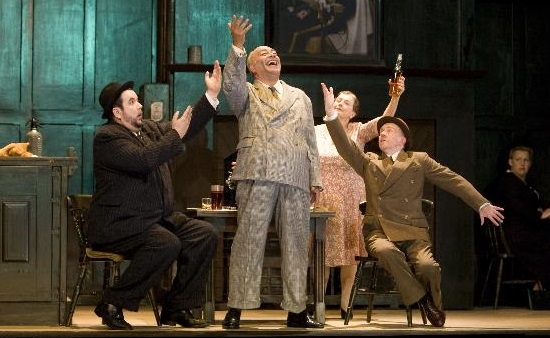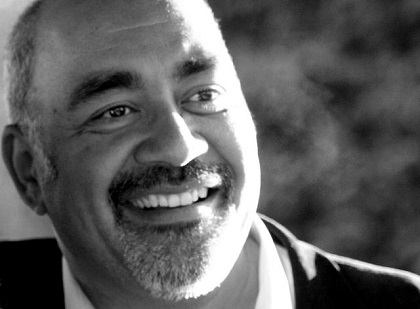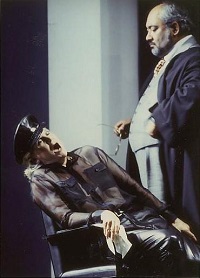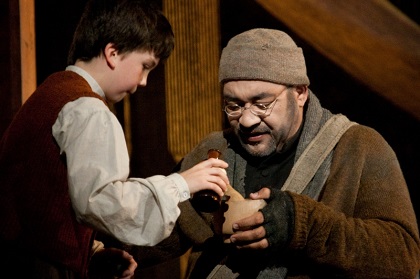“It’s no more difficult to be a Christian singer than a Christian banker or anything else”, says artist Jonathan Veira in an interview about fame, art, work and the faith that inspires him.
 Jonathan Veira during an opera appearance. / JonathanVeira.com
Jonathan Veira during an opera appearance. / JonathanVeira.com
Whether performing opera, gospel, or comedy, Jonathan Veira is a larger-than-life character with a powerful voice and big laugh. When Gavin Matthews interviewed Jonathan, he found him in a thoughtful mood, reflecting on fame, art, work, and the faith that inspires him.
Question. How did you get into opera? I’m guessing it wasn’t the suggestion of a careers teacher!?
Answer. My careers advice at school was rubbish! But I had a music teacher who was brilliant at encouraging me. I was terribly bullied, but he took me under his wing and gave me the key to practice rooms, where I started to do music all the way up through A-level. Whenever I did things on stage, he said, “Jonathan has ‘it’!” So he pushed me and pushed me and encouraged me to go on to further study.
At university they said to me, “you aren’t very good at the viola, why don’t you have singing lessons?” In my first singing lesson I thought the professor would want me to sing like a classical singer, so I did my impression of one. Now I’ve ended up singing for the last 34 years professionally… doing an impression of an opera singer; I just hope nobody finds out!
Then I studied music as a postgraduate and won some national singing competitions, which got me noticed by the famous Glyndebourne Opera Company who asked me to audition and gave me a job.
Q. What was your first lead role?
A. Well, you start with a lot of comprimario roles, an aria here or there, but my first ‘lead’ was when I did The Magic Flute. When I was 30, I did Falstaff.
Q. That’s quite young for Falstaff!
A. Yes, it was very young, and it was frightening actually. But I was starting to learn what I was doing. Recently, Stage Magazine said, ‘Jonathan Veira is the best in the UK at doing these roles,’ so now, at 55, I think it’s time to retire, while I’m still the best!
 Photo: JonathanVeira.com
Photo: JonathanVeira.comQ. The Guardian review of you in La Cenerentola described it as, ‘High camp, irony, and huge fun’; it sounds like a cross between Rossini and Monty Python!
A. In my operas I want people to laugh out loud. I don’t care about sensibilities, I’m not posh, I’m quite earthy, I suppose, and I like people to laugh at stuff that’s funny.
Q. And you like playing villains too!
A. Yeah, I do! Goodies can be fairly one-dimensional. Baddies are usually the parts which are etched by the writers more carefully. The goodies are, well … good, aren’t they!? They say the right things, do the right things, like Cinderella.
The Marriage of Figaro is a dark comedy, all about what was called the Droit du seigneur, which means the right of Counts to have the virgins of the village. But then what follows is redemption because the bad person turns good, so there’s somewhere for you to go with a villain. Don Giovanni, though, gets his comeuppance, because he doesn’t repent. So I do like playing villains! I don’t celebrate how bad they are, but you have to be bad in order to make sure that the good comes out.
Q. Some interpreters see Christ allusions in Billy Budd and you played the mutinous Claggert in there, to set the story up!
A. Yes – exactly right. Claggert was one of those who was almost totally evil, but yet there’s one moment where he delivers: I want to love but I can’t! He teeters on the edge, which is very interesting to play. Finally, Billy dies almost sacrificially, a sacrifice is made so that that goodness can be seen. I mean what else is there?
Q. Music is an extraordinary gift of God to humanity.
A. Well, if it’s not, I don’t know what is!
Q. I think we are creative people made in the image of a creator God.
 Photo: JonathanVeira.com
Photo: JonathanVeira.comA. I think so. ‘The man who hath not music in his soul, is fit for treason, stratagems and spoils!’ That’s Shakespeare, but the great poet O’Shaugnessy says, ‘we are the music makers,’ those who create order from chaos. Music puts order into a chaotic world. I intervene and I create the sound, the rhythm, the tone, the beauty. I can’t put my finger on it, but it’s something spiritual, something transcendent that happens when I sing. Now, I have been given that gift, and I haven’t been given any others. I can’t do anything else; I’m useless!
Q. But along with the gift, there is a lot of discipline in your art. How long does it take you to learn a part?
A. It took me initially six months to learn a role. I’m partially dyslexic, so I do it over and over again. To be the best at something they say you have to invest about 10,000 hours. I’ve done my 10,000 hours, so now I know the process of learning. But some of these roles take me months to learn. Some of them in Czech are very difficult.
You are actually called to be professional, with a big work ethic. I think there is something about being Christian in the way that you work; where you honour the people who come to hear you. I was quite ill recently and I had to go on and do a show, which I got through with God’s help. People said to me, ‘Why didn’t you just cancel?’ But I have a responsibility to my audience.
Q. How many languages have you performed in?
A. Eight! In whatever the opera is written in, be it Russian, French, German, Italian, Swedish, and a lot of Czech.
Q. Is it hard to deliver jokes in a language that isn’t your own?
A. Yes, but you’ve got your body as well, not just your voice. You have your face, your hands, your body position. It does mean that you have to work harder than if you are singing in English. I would say that I didn’t really know what I was doing until about 1990. You only really start learning when you perform in front of people who have paid £200 a ticket, where you either sink or swim, because opera is a ruthless world!
Q. If you could choose one performance from those 34 years as the one you are most proud of, which would it be?
A. I remember doing Falstaff in Denmark at the Verdi Festival. Danish audiences don’t applaud a lot, and they certainly don’t give standing ovations. At the end of the first night, 1500 people all stood to their feet! I wept, I really did – I wept. There are times like that …
Then there are times when I perform with my sons. They are great musicians on their own, but if you ask me for a great or favourite moment, it’s when we come together!
Then, when I did Mozart’s The Magic Flute with the famous conductor Jane Glover. It was a huge performance for me, and I came on for my bow to 3000 people giving a standing ovation. I looked behind me because I thought someone else had walked on!
But there are two sides to every story. After the applause in Denmark, everyone came back to the dressing room, saying, ‘oh how marvellous, blah blah blah,’ but then I went out of the stage door into the cold. It was snowing, and I went back to my hotel. As I walked out into the street, nobody knew who I was, nobody knew what I’d just done, there was an emptiness. I thought of people without faith; what do they do? Obviously they will drink, they will take drugs and have affairs, doing what they need to do to fill that void, because applause is a drug. So when you get back in the hotel and there’s nobody to give you adulation, it brings you right down to the brass tacks of who you are, and how you want to live and what is it that motivates you.
Q. And which came first, Christian faith or professional singing?
A. Oh, faith. I was brought up in the Christian Brethren and I came to faith quite early, but I didn’t really know what it was until I went to university.
Q. So what is at the centre of the faith you developed at university?
A. The person of Jesus! People can get bogged down in church ‘stuff’. But what we must look at first is the character and person of Jesus and if we don’t do that, if we don’t understand who he is, everything else pales into insignificance. When Jesus isn’t central, what becomes central is ‘my place in the church’, which doesn’t actually matter! So, I’m a Christian today, not just for Sunday, not just when I do my shows, but when you catch me now. Here’s who I am, this is me, and that is both a weakness and a strength.
Q. You’ve never hidden your faith in the opera world though.
A. No
 Photo: JonathanVeira.com
Photo: JonathanVeira.comQ. How have people responded?
A. Some people are antagonistic and want an argument! I don’t present myself as some kind of virtuous, perfect guy. I just turn up and start working. I sometimes lose my temper, like everyone else does, but it’s how I then go and apologise that contextualises my faith. I don’t take my Bible to work and preach at people, but people do want to talk to me. Someone recently came to me asking, ‘What do you think about faith? Is it difficult to be a Christian?’ and I said to him, ‘Yes it is’. But it’s no more difficult to be a Christian singer than a Christian banker or anything else. You take in your core values, and your faith. You walk in with Jesus and you walk out with him.
Christians are deliberately very misunderstood by an atheistic media who want to decry faith. But rather than shout and scream about that I just say, ‘well this is me; you can criticise me as much as you like. I’m doing my job, I’m doing it well.’
Q. How do people respond when you talk about your faith in Jesus in your one-man show?
A. We’ve always wanted my shows to be a place where people could bring their non-church friends where they wouldn’t be embarrassed or made to cringe. I just talk about my faith and share it in song. And I have lots of responses, from total elation to utter disgust. From ‘how could you mention your faith; what’s that got to do with anything!’ to ‘I can’t believe you’ve made me think about faith, and now I’ve become a Christian!’
Q. And you sing songs like, I Want Jesus to Walk With Me.
A. Yeah, by Eric Bibb! It’s one of the most wonderful songs. I often close my shows with that song, followed by How Great Thou Art.
Q. What’s your next musical project?
A. At the moment I have backed away from opera, I’m still doing it, but when I choose to. I’m now touring my one-man show ‘Song and Tales’.
Q. Do you have any musical ambitions left?
A. There’s one I would love to do… Sweeney Todd! I played the judge in Sweeney Todd, at Covent Garden with the legendary Stephen Sondheim. Todd is the arch-baddie, but one who’s been wronged. And there is also redemption for him somewhere in there! I would fancy that.
Q. What about personal ambitions?
A. I did want to play cricket for England but that ship has sailed, I’m afraid. Off-stage, I always want to be a better person because ultimately, ‘singing is more than a job, but it’s less than a life!’
Q. So what makes a complete life?
A. I think having God in your life gives you context. It settles you where you are, tells you where you are in the universe: that you’re not the centre of it, but that God is, and He loves you.
You can visit Jonathan Veira’s website.
This article was published with permission of Solas magazine. Solas is published quarterly in the U.K. Click here to learn more or subscribe.

Las opiniones vertidas por nuestros colaboradores se realizan a nivel personal, pudiendo coincidir o no con la postura de la dirección de Protestante Digital.
Si quieres comentar o